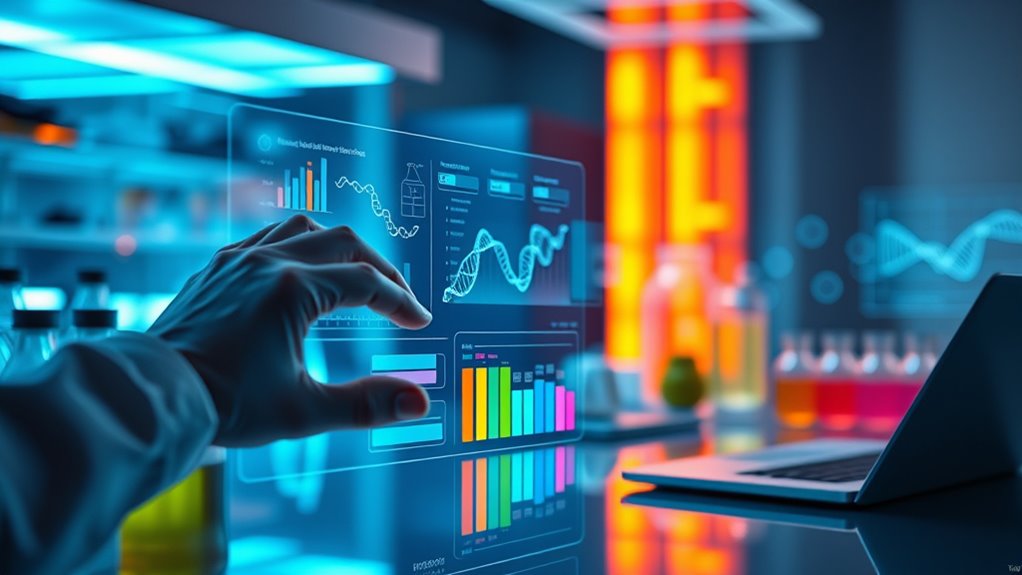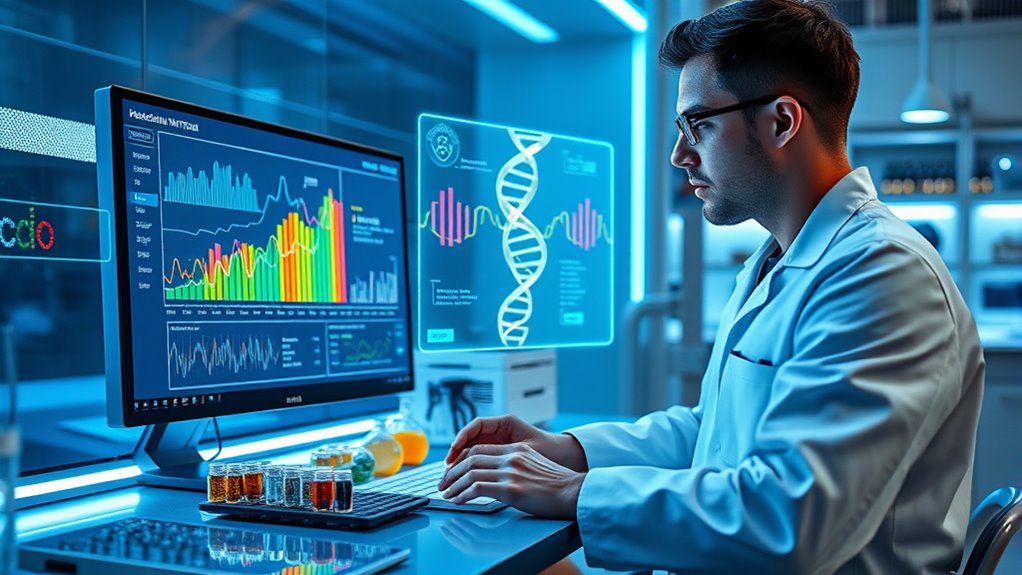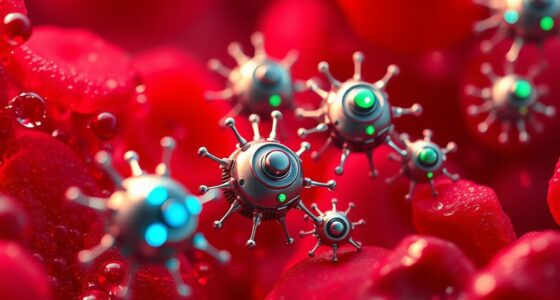Personalized nutrition algorithms offer the promise of tailored diets that could improve your health and reduce disease risks through genetic insights. However, they also pose significant privacy risks, as sensitive data might be misused, sold, or lead to discrimination if not properly protected. While these tools can be promising, they often overlook factors like lifestyle and culture. To understand how to navigate this balance, there’s more you should consider about both potential benefits and hidden risks.
Key Takeaways
- Personalized nutrition algorithms offer tailored dietary insights that can improve health outcomes and reduce disease risks.
- They rely on sensitive genetic data, raising significant privacy concerns and potential misuse or unauthorized sharing.
- Risks include data breaches, discrimination, and regulatory gaps that may undermine user trust and safety.
- Overemphasis on genetics might overlook lifestyle, cultural, and environmental factors essential for effective nutrition.
- Responsible use requires balancing technological innovation with strong data protections and ethical considerations.

Have you ever wondered how technology can tailor your diet to fit your unique needs? Personalized nutrition algorithms are transforming the way we approach health and wellness, promising solutions that are more precise than ever before. At the core of this innovation lies genetic testing, which analyzes your DNA to uncover insights about how your body responds to different foods, nutrients, and dietary patterns. By understanding your genetic makeup, these algorithms aim to craft nutrition plans tailored specifically to you, potentially optimizing your health outcomes and reducing the risk of chronic diseases. However, as enticing as this prospect sounds, it also raises significant concerns about data privacy. When you undergo genetic testing, sensitive information about your health and biological predispositions is collected and stored. Many wonder who has access to this data and how it’s protected from misuse or breaches. Ensuring data privacy becomes paramount when dealing with such personal and potentially sensitive information, especially given the increasing prevalence of cyber threats and data leaks.
While the promise of personalized nutrition algorithms is impressive, it’s essential to recognize the risks involved. As you share your genetic data, you entrust a lot of personal information to companies that develop these algorithms. If data privacy measures are lax, this information could be exploited or sold without your consent, leading to potential discrimination or privacy violations. Regulations and safeguards are still catching up with technological advances, leaving a gray area that consumers need to navigate carefully. Transparency from companies about how your data is used, stored, and shared is critical, but not always guaranteed. Furthermore, the accuracy of genetic testing itself can vary, which means that recommendations based solely on this data might not be foolproof. There’s a danger in over-relying on genetic insights, ignoring other factors like lifestyle, environment, and personal preferences that also shape your nutritional needs. Additionally, emerging cultural and regional influences on diet are vital considerations that genetic data alone may not fully address.
Despite these concerns, many see personalized nutrition algorithms as the future of health management. They hold the promise of more effective, customized diets that can improve well-being and longevity. But to fully realize these benefits, you need to be vigilant about your data privacy rights. Stay informed about how your genetic information is handled and advocate for strong protections. As technology advances, the balance between innovation and privacy will determine whether personalized nutrition truly becomes a safe and beneficial tool for everyone. Ultimately, embracing these tools responsibly can help you access the potential of a diet designed just for you—if you’re mindful of the privacy and ethical implications involved.
Frequently Asked Questions
How Accurate Are Personalized Nutrition Algorithms in Predicting Health Outcomes?
You’re curious about how accurate personalized nutrition algorithms are in predicting health outcomes. Their algorithm accuracy varies, depending on data quality and individual differences. While they can provide useful insights for health prediction, they’re not foolproof and often lack precision for everyone. You should view these tools as helpful guides rather than definitive answers, and always consult health professionals for personalized advice.
What Privacy Measures Protect User Data in Personalized Nutrition Platforms?
You’re concerned about your data privacy on personalized nutrition platforms. These platforms protect your information through data encryption, which secures your data from unauthorized access. Additionally, they require your explicit user consent before collecting or sharing any personal details. By prioritizing data encryption and obtaining clear user consent, these platforms aim to safeguard your privacy while offering tailored nutrition advice, giving you more control over your sensitive information.
Can These Algorithms Replace Professional Dietary Advice?
Think of algorithms as helpful guides, but they shouldn’t replace a seasoned dietitian’s oversight. While they can offer personalized suggestions, they often miss cultural nuances and individual health complexities. You need expert advice to navigate these subtleties, ensuring your plan fits your lifestyle and needs. Relying solely on algorithms risks overlooking essential factors that a professional dietitian, with their experience and cultural understanding, can provide.
How Do Genetics Influence Personalized Nutrition Recommendations?
Genetics play a key role in personalized nutrition recommendations by revealing your unique genetic markers. These markers help identify how your body processes nutrients, responds to certain foods, and manages metabolic functions. With this information, dietary customization becomes more precise, allowing you to tailor your diet to optimize health and prevent disease. Understanding your genetics empowers you to make smarter, more effective nutritional choices based on your individual biological makeup.
Are There Risks of Bias in Algorithm-Generated Dietary Plans?
They say “trust, but verify,” and that’s key here. Bias risks exist in algorithm-generated plans if transparency isn’t prioritized, leading to skewed recommendations. You should ask who owns the data and how transparent the algorithms are. Without clear data ownership and transparency, biased results may slip through, impacting your health decisions. Staying informed about these factors helps you make safer, more equitable choices in personalized nutrition.
Conclusion
As you navigate personalized nutrition algorithms, remember they’re like guiding stars—bright with promise but sometimes distant or unpredictable. They hold the potential to illuminate your unique health path, yet their shadows can obscure true wellbeing. Trust in these tools, but don’t forget your own compass—your intuition and knowledge. Ultimately, these algorithms are just lanterns on your journey, lighting the way, but it’s your own inner light that will truly lead you to health and balance.









